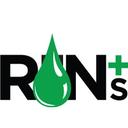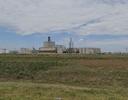Pillars of New Production

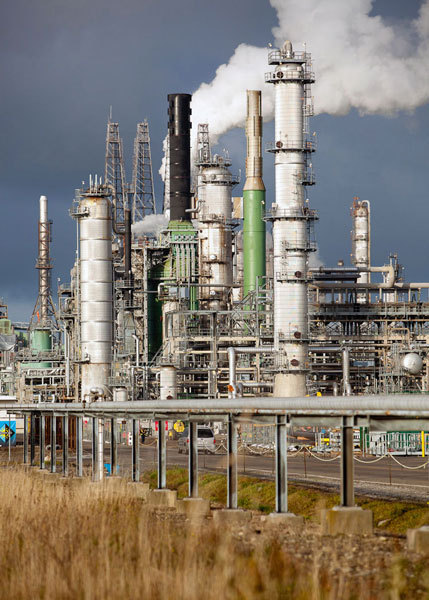
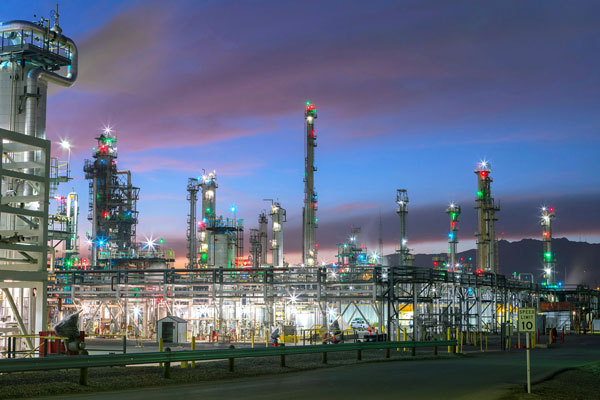
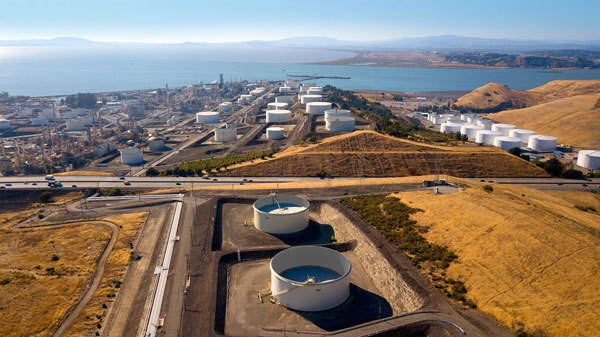
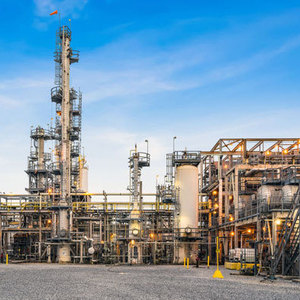
PHOTO: REG
December 20, 2021
BY Tom Bryan
A year ago, Biodiesel Magazine reported that there were four operational renewable diesel plants in the U.S., including two expanding facilities—producing 90 MMgy and 275 MMgy, respectively, before and while upsizing, plus Marathon’s completed 184 MMgy plant in North Dakota. That impressive 549 million gallons of existing annual capacity, we predicted, would soon be eclipsed by half a dozen more refineries under construction, or, more aptly, reassignment to biofuels production.
Our last report conjectured that even with the federal biodiesel tax credit needing renewal at the end of 2022, the value of California’s LCFS credits—and, for obligated parties, reducing RFS/RIN exposure—was incentive enough for most developers to move forward with projects—some massive—involving not just renewable diesel, but sustainable aviation fuel (SAF), renewable naphtha and other coproducts. That first big wave of construction, we said 12 months ago, represented over 2 billion gallons of biobased-diesel capacity, while a pack of five proposed facilities, waiting in the wings, represented another 3.3 billion gallons of potential capacity. Altogether, the 14 facilities on last year’s list represented nearly 5.5 billion gallons of new or potential capacity, roughly double the output of the 100 or so legacy biodiesel plants in the U.S. fleet at the time.
Despite the challenges of the pandemic, renewable diesel’s growth trajectory was not interrupted in 2021. By the end of the year, our renewable diesel/SAF plant list had swelled to 26 facilities—including those that are operational, expanding, under construction and proposed—altogether representing more than 6.6 billion gallons of potential production volume (not including the already established 2.5 billion gallons of conventional biodiesel). But while our renewable diesel plant list grew, the number of operational biodiesel plants in our database decreased by about 30%, to 69 facilities. It should be noted, however, that Biodiesel Magazine removed plants under 5 MMgy from its annual map and plant list in late 2021 because it had simply become too difficult to verify production at small, community-based facilities that often don’t have websites or on-site personnel able to verify data.
At press time in early December, operational renewable diesel volume in North America was estimated at approximately 790 MMgy, with an eye-popping 1.7 billion gallons under expansion (five facilities) and another 1.6 billion gallons under construction or reconfiguration (nine facilities). Since last year, the number of proposed facilities increased from five to 11, representing about 2.5 billion gallons of potential future production volume. Not surprisingly, California led the way, in terms of existing, expanding and under construction volume with 1.65 billion gallons—nearly 1 billion of which is coming from two massive plant expansions (World Energy and Marathon Petroleum). Louisiana isn’t far behind, though, with over 1 billion in operational and expanding volume represented by existing producers REG and Diamond Green Diesel. Construction and development timelines vary widely across the industry, with some projects in or near startup and others still 12 to 24 months out from completion. Some projects are envisioned happening in stages, with refinery units being added over time.
Here, in alphabetical order, is an overview of the 26 North American renewable diesel projects currently in Biodiesel Magazine’s database.
1. Aemetis Carbon Zero
PROPOSED: 45 MMgy
Riverbank, California
Currently defined as under development, this renewable diesel/SAF project is located at the site of a former U.S. Army ammunition plant in Riverbank, California. The facility will hydrotreat renewable oils from orchard and forestry waste. By coupling renewable electricity (e.g., hydro power) with carbon sequestration, along with carbon-negative hydrogen and low-CI feedstocks, the plant could produce among the lowest carbon intensity renewable jet and diesel fuel in the world. It is expected to be built and operable by the end of 2023; it could later expand to 90 MMgy by 2025. Notably, Aemetis plans to supply American Airlines with SAF, starting in 2024.
2. Bakersfield Renewable Fuels
UNDER CONSTRUCTION:
230 MMgy
Bakersfield, California
The parent company to this facility, Global Clean Energy Holdings Inc., acquired the Bakersfield refinery for a reported $365 million in 2020 and is currently completing a retrofit of the facility to produce renewable diesel, liquid propane and naphtha. The plant will use a variety of feedstocks including waste fats, used cooking oil, soybean oil and distillers corn oil, while relying mostly on GCEH’s proprietary camelina oil. The facility is expected to be commissioned by mid-2022. Haldor Topsoe is supplying the plant with its HydroFlex process technology. ExxonMobil recently doubled down on its existing offtake agreement for renewable diesel from the plant.
3. BP - Cherry Point Refinery
OPERATIONAL/EXPANSION:
55 MMgy/110 MMgy
Blaine, Washington
BP announced in October that it is making a $269 million investment in its Cherry Point Refinery in northwest Washington, not only to increase renewable diesel production, but to improve the refinery’s efficiency and lower its carbon intensity. The company has directed $45 million of that overall sum to its renewable diesel expansion, which will double the refinery’s current output of 55 MMgy to 110 MMgy. In 2018, Cherry Point became the first refinery in the Pacific Northwest capable of coprocessing feedstocks such as vegetable oils and animal fats alongside conventional feedstocks like crude oils. (Note: coprocessing may or may not be defined by some industry experts as pure-play hydroprocessed renewable diesel.)
4. Covenant Energy Ltd.
PROPOSED: 80 MMgy
Estevan, Saskatchewan
This Saskatchewan, Canada-based company announced its proposed renewable diesel plant in early 2021, naming Haldor Topsoe as the facility's technology provider and Gas Liquids Engineering as its engineering firm. The plant would use canola oil as its primary feedstock; Covenant’s president and CEO is part of a fifth-generation canola farming family based in Saskatchewan. Producing SAF is also part of the plan. The company is targeting the end of 2023 for initial production, with plans to ramp up to full-scale in 2024.
5. CVR Energy Inc. – Wynnewood
UNDER CONSTRUCTION:
100 MMgy
Wynnewood, Oklahoma
In late 2020, CVR Energy Inc. confirmed that its board of directors had approved a plan to retrofit the company’s refinery in Wynnewood, Oklahoma, to produce renewable diesel and naphtha. The project—centered around converting the facility’s hydrocracker unit to renewable diesel production—was expected to be complete in mid-2021, but final steps of the project were delayed due to high feedstock prices earlier in the year. In November, the company said it was ready to complete the conversion work on its hydrocracker and work toward startup in early 2022.
6. CVR Energy Inc. – Coffeyville
PROPOSED: 150 MMgy
Coffeyville, Kansas
While CVR’s Oklahoma biorefinery nears startup, an even larger plant in Kansas is reportedly progressing toward construction. In late 2021, the company said engineering work was underway on a conversion project that would allow the Coffeyville facility to produce approximately 150 MMgy of renewable diesel, with an option for up to 25 MMgy of SAF. The company has not provided a timeline for the plant’s conversion and commissioning, but a 12- to 24-month schedule would be typical, once approved for development.
7. Diamond Green Diesel - Norco
OPERATIONAL/EXPANSION:
290/675 MMgy
Norco, Louisiana
Diamond Green Diesel, a joint venture between Darling Ingredients and a subsidiary of Valero Energy Corp., has just finished boosting the refinery’s capacity from 190 MMgy to 690 MMgy. The project was reportedly set for completion by the end of 2021. However, Biodiesel Magazine was unable to confirm whether the refinery’s newest units were online or still in startup, in December. Commissioning was only slightly delayed by Hurricane Ida in late August, as the company took the plant offline temporarily to brace for the storm—without incident. Both the existing and new units of the refinery utilize Honeywell’s Ecofining processing technology.
8. Diamond Green Diesel -
Port Arthur
UNDER CONSTRUCTION:
470 MMgy
Port Arthur, Texas
Diamond Green Diesel’s second renewable diesel plant in Port Arthur, Texas, continues to progress and is still expected to be operational in the first half of 2023. Development of the 470 MMgy facility would boost Diamond Green Diesel’s annual renewable diesel production capacity to 1.16 billion gallons per year. The two facilities would also be capable of producing a combined 100 MMgy of renewable naphtha.
9. Grön Fuels LLC
PROPOSED: 900 MMgy
Baton Rouge, Louisiana
Grön Fuels LLC is still studying the feasibility of a renewable fuel complex at the Port of Greater Baton Rouge. With eventual expansions and associated projects, the complex could evolve into a $9.2 billion investment over the next decade. Located on the west bank of the Mississippi River near Port Allen, the first phase of construction would involve a capital investment of over $1.25 billion and eventually produce more than 900 MMgy of renewable diesel from soybean oil, corn oil and animal fats, with an option to also produce SAF. The refinery would utilize Haldor Topsoe’s Hydroflex technology and Alfa Laval’s pretreatment platform.
10. Heartwell Renewables
(Love’s/Cargill)
UNDER CONSTRUCTION:
80 MMgy
Hastings, Nebraska
In the spring of 2021, the Love’s Family of Companies—which owns a chain of more than 550 travel stops and country stores in the Midwest—announced that it had partnered with Cargill in a 50/50 joint venture to produce and market renewable diesel. The joint venture, called Heartwell Renewables, is being built in Hastings, Nebraska, and will reportedly produce 80 MMgy from predominantly tallow, a rendered animal fat. The early stages of construction began in late 2021 and company officials say the plant could be in operation by early 2023.
11. HollyFrontier Corp. - Artesia
UNDER CONSTRUCTION:
110 MMgy
Artesia, New Mexico
HollyFrontier Corp. announced in mid-2021 that its board of directors had approved a plan to construct a pretreatment unit (PTU) at its Artesia, New Mexico, refinery, enabling the facility to produce approximately 110 MMgy of renewable diesel, and giving the company a total capacity of more than 200 MMgy (see Cheyenne project below). The refiner is reportedly investing as much as $750 million in its renewables business. The Artesia PTU, supplied by Alpha Laval, will process more than 80% of the feedstock for both of HollyFrontier’s renewable diesel plants—Artesia and Cheyenne. The facility is expected to come online in the first quarter of 2022.
12. HollyFrontier Corp. - Cheyenne
UNDER CONSTRUCTION:
90 MMgy
Cheyenne, Wyoming
Along with its New Mexico project, HollyFrontier is also repurposing its Cheyenne, Wyoming, refinery to produce 90 MMgy of renewable diesel. Like the Artesia facility, this project is expected to be complete in the first quarter of 2022. The conversion of the plant to renewable diesel production will result in HollyFrontier ceasing petroleum refining altogether at the Cheyenne unit.
13. Imperial Oil Ltd. (ExxonMobil)
PROPOSED: 260 MMgy
Edmonton, Alberta
In August, Imperial Oil Ltd., a majority-owned Canadian affiliate of ExxonMobil, announced that it is moving forward with plans to construct a 260 MMgy renewable diesel complex at its Strathcona refinery near Edmonton, Alberta. The company stated that regionally sourced feedstocks will be used, and also indicated that blue hydrogen—that is, hydrogen produced from natural gas with carbon capture and storage—would be used in the process with a proprietary catalyst. No updates on the possible start of construction were available, but the company has stated that it expects the plant to be operational by 2024.
14. Louisiana Green Fuels
(Strategic Biofuels)
PROPOSED: 34 MMgy
Caldwell Parish, Louisiana
While construction of this northern Louisiana renewable diesel plant has not commenced, critical work has. As reported in “Going Low in Louisiana” on page 16, Strategic Biofuels has successfully completed critical test well stratigraphic analysis necessary to obtaining a permit for a class VI carbon capture and storage (CCS) injection well. According to developers, CCS will make the renewable diesel produced at this facility—made from commercial forest waste—ultra-low carbon (with an estimated LCFS carbon intensity, or CI, of negative 238). The project cost is projected to be as much as $1.5 billion. The company will continue working on project engineering and permitting throughout 2022, and expects the facility to be built and mechanically complete by mid-2025.
15. Marathon Petroleum - Dickinson
OPERATIONAL: 184 MMgy
Dickinson, North Dakota
Marathon’s renewable diesel refinery in North Dakota has been up and running for about a year, reaching full capacity in July and reportedly producing at or above nameplate capacity (184-190 MMgy) during the second half of 2021 (read more in “Where Oil and Ag Mix,” page 12). The refinery consumes pretreated feedstock from a biodiesel plant Marathon purchased in 2020, the 50 MMgy Duonix biodiesel plant in Beatrice, Nebraska, which was idled in 2019 by its previous owner. Marathon is using that facility to aggregate and pretreat feedstocks such as distillers corn oil, soybean oil and rendered fats, before shipping them up to North Dakota as a ready-made renewable diesel input. Once ADM's soybean crushing facility under construction in Spiritwood, North Dakota, is complete, the Marathon facility will also utilize soybean oil as a feedstock. The plant utilizes Haldor Topsoe’s HydroFlex processing technology.
16. Marathon Petroleum - Martinez
UNDER CONSTRUCTION:
260 MMgy
Martinez, California
In late 2021, Marathon reported that the detailed engineering and permitting work on its Martinez conversion is progressing on schedule, and an environmental impact report on the project was released to the public in October. While the facility was not officially under construction at press time, its biofuels realignment has likely already started, hence its status on our list. According to Marathon, this facility could ultimately produce as much as 730 MMgy by the end of 2023, but it is listed here as a 260 MMgy plant, based on its initial targeted volume expected in the second half of 2022. It will process primarily animal fats, soybean oil and distillers corn oil.
17. Montana Renewables LLC
(Calumet)
UNDER CONSTRUCTION:
150 MMgy
Great Falls, Montana
In late 2021, Calumet Specialty Products Partners L.P. announced that it had secured a key permit for its renewable diesel project in Great Falls, Montana, allowing work to begin ahead of schedule. Also, the company recently secured critical financing for the project. Work is reportedly under way—a ribbon-cutting to launch the project, with the governor of Montana in attendance, was held in August. Conversion of the existing refinery is expected to be complete in 2022, with operations scheduled to begin in the second quarter of the year.
18. Next Renewable Fuels Inc.
PROPOSED: 500 MMgy
Clatskanie, Oregon
While this project has not been in the news in 2021, records with the Oregon Department of Environmental Quality indicate that a public meeting was scheduled as recently as September related to air and water quality permitting, indicating that the project is still active. Next Renewable Fuels is a proposed renewable diesel plant near Clatskanie, Oregon, with a projected $1 billion price tag. If approved and constructed, the refinery would initially be capable of producing more than 500 MMgy of advanced biofuels, later growing to more than 750 MMgy. The feedstock-agnostic refinery would utilize white and brown grease, animal tallow, soy oil and a variety of vegetable oils. Both the feedstock and the outgoing biofuel would be transported to and from the refinery by ship, through the Port of Columbia’s Port Westward Industrial Park.
19. PBF Chalmette Refinery
PROPOSED: 300 MMgy
Chalmette, Louisiana
PBF Energy, a large, independent petroleum refiner, announced in early 2021 that it is evaluating the feasibility of a renewable diesel project at its existing refinery in Chalmette, Louisiana. The plant would be well-positioned on the Gulf Coast with access to water, rail and truck logistics. The refinery also has an idled hydrocracker unit in place—and ample supply of hydrogen—making the plant capable of processing any renewable feedstock at industry-leading speed and cost, a company spokesperson said. The company is prepared to make a $550 million capital investment in the retrofit. A final investment decision is expected in the coming months. Honeywell’s Ecofining technology has been selected for the proposed project.
20. ReadiFuels - Iowa LLC
PROPOSED: 36 MMgy
Manly, Iowa
Chevron Lummus Global LLC and Applied Research Associates Inc. announced in June that the companies have been awarded a technology contract by ReadiFuels-Iowa LLC for their renewable diesel and SAF project in north-central Iowa. The scope of the project includes the technology license, basic engineering, catalyst supply and proprietary equipment. The technology that the two companies have jointly developed is expected to help ReadiFuels-Iowa produce sustainable aviation fuel, renewable diesel and renewable naphtha. The plant will process used cooking oil and distillers corn oil, as well as some yellow grease, brown grease, animal fats and nonfood energy crop oils. Construction could start by mid-2022, with an estimated completion date in late 2023 or early 2024.
21. Phillips 66 - Rodeo Renewed
OPERATIONAL/EXPANSION:
120/800 MMgy
Rodeo, California
In mid-2020, Phillips 66 announced its intention to reconfigure its refinery in Rodeo, California (near San Francisco), to produce a variety of renewable fuels. The plant will no longer produce fuels from crude oil, switching entirely to biobased inputs: used cooking oil, fats, greases and soybean oil. This past summer, the company announced the hydrotreater conversion at the refinery had reached full capacity. The facility can produce up to 8,000 barrels per day of renewable diesel, equivalent to approximately 120 MMgy. Subject to permitting and approvals, full conversion of the refinery is expected to be complete in early 2024. The conversion project will boost the facility’s renewable fuel production capacity to 50,000 barrels per day, or approximately 800 MMgy. The refiner is using Haldor Topsoe’s HydroFlex technology.
22. REG Geismar LLC
OPERATIONAL/EXPANSION:
90/340 MMgy
Geismar, Louisiana
Although an emergency shutdown in advance of Hurricane Ida in late August resulted in two weeks of unplanned downtime at REG’s plant in Geismar, Louisiana, activity there was full steam ahead at press time. The storm caused no material damage to the refinery and did not delay the expansion project currently underway. The project will result in the addition of 250 MMgy of production capacity to the facility, boosting its annual volume to about 340 MMgy. A groundbreaking ceremony for the expansion was held Oct. 14, although work began months earlier. Current plans call for the Geismar facility to continue to produce renewable diesel, but SAF is also being considered. The project is expected to reach mechanical completion in late 2023, at a total cost of about $825 million.
23. Ryze Renewables - Las Vegas
PROPOSED: 100 MMgy
Las Vegas, Nevada
In 2020, Biodiesel Magazine reported that Ryze Renewables had two projects under development in Nevada, one near Las Vegas and another in Reno. We reported in 2021 that the company had sold the Reno project—a 50 MMgy facility—and was focusing exclusively on the development of its 100 MMgy refinery in Las Vegas (at the former site of Biodiesel of Las Vegas). The project is located on a developed 14-acre property that includes utilities, operation buildings and tanks setup to process fuel products. At press time in December, additional information (i.e., beyond what was reported last year) was not available. Note: this project was listed as under construction in 2021 but is now listed as proposed due to the uncertainty of its status.
24. Seaboard Energy
UNDER CONSTRUCTION:
85 MMgy
Hugoton, Kansas
Seaboard Energy, already a producer of biodiesel and ethanol, made a strong move into renewable diesel in 2021, announcing that it would leverage existing infrastructure at the site of a beleaguered cellulosic ethanol plant in Hugoton, Kansas, to build an 85 MMgy renewable diesel plant. The facility will also produce about 8.5 million gallons of renewable naphtha. The renewable fuels will be primarily derived from local animal fats and vegetable oils. Seaboard purchased the facility and the surrounding 800 acres in early 2019 and has since recommissioned portions of the idle assets while simultaneously building out greenfield renewable diesel production capabilities. The plant was originally expected to be running by the end of 2021, so an early 2022 startup seems likely.
25. Vertex Energy Inc.
PROPOSED: 150 MMgy
Mobile, Alabama
In mid-2021, Vertex announced it had entered into an agreement to acquire an oil refinery in Mobile, Alabama. The company plans to convert a portion of the facility to renewable diesel production. Vertex reportedly paid $75 million to acquire the refinery and plans to complete an $85 million upgrade of its hydrocracking unit by the end of 2022, enabling production of about 150 MMgy of renewable diesel. By mid-2023, Vertex plans to expand the refinery’s capacity to 200 MMgy. Notably, the facility will continue to produce conventional petroleum fuels.
26. World Energy - Paramount
OPERATIONAL/EXPANSION:
50/360 MMgy
Paramount, California
World Energy, which owns four biodiesel plants in the U.S. and one in Canada, acquired the Paramount refinery, near Los Angeles, in 2018, making a reported $350 million investment to fully convert the facility to renewable diesel production. While running at about 50 MMgy now, the company is expanding the plant to produce 360 MMgy of renewable diesel, SAF, renewable military fuel, renewable naphtha and other products. The refinery is on a 65-acre complex that includes product storage tanks and truck and rail loading and unloading facilities. The expansion is scheduled for completion in 2023.
Author: Tom Bryan
Biodiesel Magazine
tbryan@bbiinternational.com
701-746-8385
Advertisement
Advertisement
Related Stories
Biodiesel capacity in the U.S. and Canada dipped slightly stable in 2024, with several renewable diesel producers reporting headwinds and lower margins alongside a drove of SAF projects in various stages of development.
The IEA’s Task 39 group has new research regarding the development and status of the sustainable aviation fuel industry.
The U.S. EPA on Nov. 16 released updated RIN data, reporting that nearly 2.11 billion RINs were generated under the RFS in October, up from 1.81 billion generated during the same month of last year.
Conestoga to host SAFFiRE cellulosic ethanol pilot plant
Conestoga Energy and SAFFiRE Renewables LLC announced on Nov. 16 their agreement for Conestoga to host SAFFiRE’s cellulosic ethanol pilot plant at Conestoga’s Arkalon Energy ethanol facility in Liberal, Kansas.
Officials at Calumet Specialty Products Partners L.P. discussed the company’s proposed plans to boost sustainable aviation fuel (SAF) production at its Montana Renewables biorefinery during third quarter earnings call, held Nov. 9.
Upcoming Events



